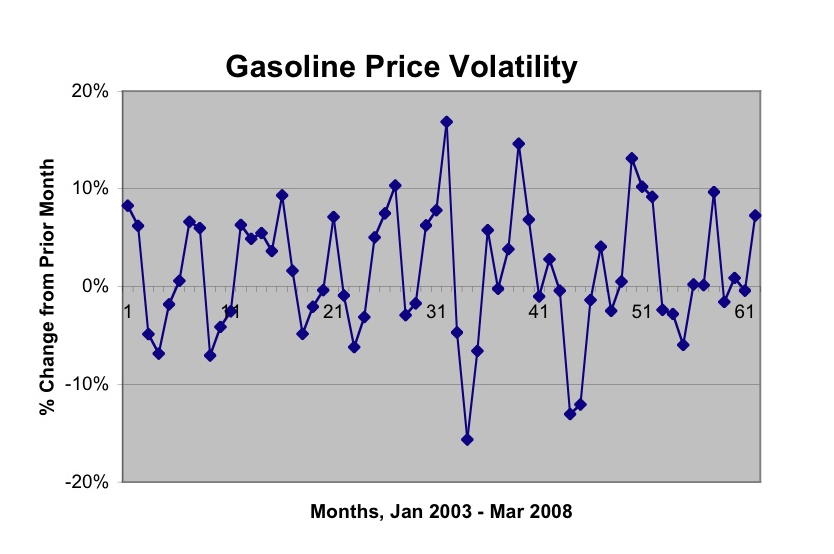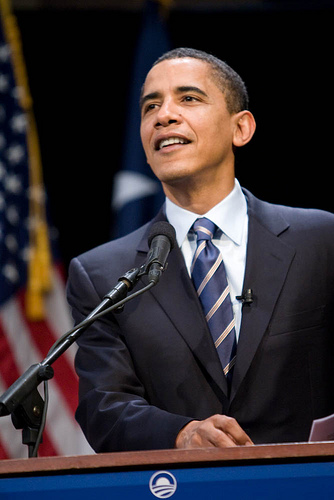Note added April, 2017: A more current and in-depth treatment of the price-elasticity of U.S. gasoline usage may be found in our Sept 2015 blog post, What an Energy-Efficiency Hero Gets Wrong about Carbon Taxes. — editor.
With gas at $3.50 a gallon in April, the U.S. mainstream media is replete with stories of drivers abandoning SUV’s, hopping on mass transit, and otherwise cutting back on gasoline. Yet a year or two ago, when pump prices were approaching and even passing the $3.00 “barrier,” the media mantra was that demand for gasoline was so inelastic that high prices were barely making a dent in usage.
Which story is correct? We lean toward the more “elastic” view, and here we’d like to share some of the data that inform our belief.
 I’ve been tracking official monthly data on U.S. gasoline consumption for the past five years, and compiling the numbers in this spreadsheet. You’ll find that it parses the data in several different ways: year-on-year monthly comparisons (say, March 2008 vs. March 2007); three-month moving averages that smooth out most of the random variations in reporting; and full-year comparisons that allow a bird’s-eye view.
I’ve been tracking official monthly data on U.S. gasoline consumption for the past five years, and compiling the numbers in this spreadsheet. You’ll find that it parses the data in several different ways: year-on-year monthly comparisons (say, March 2008 vs. March 2007); three-month moving averages that smooth out most of the random variations in reporting; and full-year comparisons that allow a bird’s-eye view.
Here’s what we see in the data:
- Gasoline demand is trending downward, though only slightly. In the 49 year-on-year comparisons, monthly gasoline use dipped below the year-earlier level only eight times, but these include each of the last five months (see Moving Avgs worksheet in the cited spreadsheet).
- Gasoline’s short-run price-elasticity is rising. After a low of -0.04 in 2004, the short-run price-elasticity increased to -0.08 in 2005, -0.12 in 2006 and -0.16 in 2007. (I assume an “income-elasticity” of two-thirds in calculating price-elasticity; again, see Full Years worksheet.)
- A big reason that gasoline use kept rising until recently was the growing economy. Demand is heavily affected by economic activity. The minimum year-on-year GDP growth for any month in all four years was plus 1.7% (see Moving Avgs worksheet).
- Another reason gasoline demand was slow to drop is that the price signal, while significant, was less than advertised. Adjusted for general inflation, the average 2007 pump price was only 54% higher than the 2003 price. Amid all the talk of a doubling or even tripling in gas prices, it’s sobering to learn that you have to go all the way back to 1998 to find the last year that the real price was just half the 2007 price.
- The biggest market barrier of all may have been gasoline price volatility. The spreadsheet spans 63 months, allowing 62 month-to-month comparisons. In 29 of these, the price went down (see 1-yr comparison worksheet). That’s right: the average gasoline price was less than the prior month’s an astounding 47 percent of the time (see graph). Pump prices have been so volatile that consumers didn’t know whether the price three months later would be up or down. The result? American families and automakers alike found it hard to justify long-term investments in more-efficient cars. And allied policies like de-subsidizing sprawl didn’t get taken seriously.
- Nevertheless, gas prices have now risen five years in a row and are virtually certain this year to chalk up a sixth. There hasn’t been a comparable period of sustained increases since the late 1970s.
The big takeaway for carbon taxes is that the short-run price-elasticity of gasoline demand is rising (Point #2). (The long-run price-elasticity is probably around minus 0.4, as we discuss here.) While a rising elasticity contradicts the standard economic model in which price-sensitivities don’t change much over time, Point #5 provides a reasonable explanation: gasoline prices (and energy prices in general) had fluctuated so wildly for decades, and a sense of entitlement to cheap gasoline had become so ingrained in American society, that it took a long time for households and businesses to internalize the rise in pump prices — to regard it as real.
Perhaps now, however, a line has been crossed. Maybe the trigger was the price of crude breaching $100 a barrel, or the unspooling credit crisis signaling a fundamental change in the U.S. economy. Or it may simply have been the accumulating weight of price increases noted in Point #6. Whatever the reason(s), Americans seem, finally, to be getting the message that higher gas prices are here to stay.
That’s good news for the climate, national security, and green jobs. But bitter medicine for hard-pressed families as well as business and jobs that aren’t oil-intensive but are being pulled under by gasoline-caused belt-tightening. Imagine if the price rises had been delivered not by a rapacious market but via socially determined ramped-up increases in the gasoline tax (as some commentators have proposed since the 1970s, including, with renewed urgency, after 9/11).
Americans would have had time to adapt, along with real choices such as truly fuel-efficient cars and smaller houses in more-compact developments. And the extra revenues from the higher-priced gasoline would have belonged to all of us rather than just the owners of oil reserves. Those revenues could have been returned to households and businesses via tax-shifts or dividends, and not skimmed off for private enrichment.
The analogy to a revenue-neutral carbon tax couldn’t be more clear.

 The poll showed even greater support for "an environmental tax refund paid to those who succeed in reducing their use of fossil fuels, electricity, water and the amount of garbage they produce," with 80% support and only 16% opposition.
The poll showed even greater support for "an environmental tax refund paid to those who succeed in reducing their use of fossil fuels, electricity, water and the amount of garbage they produce," with 80% support and only 16% opposition. “Voters sent a powerful message yesterday that they are not willing to sacrifice the environmental and economic benefits of the gasoline tax for trivial, short-term benefits,” said Daniel Rosenblum, co-director of the Carbon Tax Center. “Voters in Indiana and North Carolina have driven a spike through the conventional wisdom that supporting a tax is political suicide. The path is cleared for consideration of a revenue-neutral carbon tax-and-dividend approach that cost-effectively reduces greenhouse gas emissions, strengthens the economy, reduces America’s dangerous dependence on foreign oil and returns the tax proceeds to all Americans through monthly dividends,” Rosenblum said.
“Voters sent a powerful message yesterday that they are not willing to sacrifice the environmental and economic benefits of the gasoline tax for trivial, short-term benefits,” said Daniel Rosenblum, co-director of the Carbon Tax Center. “Voters in Indiana and North Carolina have driven a spike through the conventional wisdom that supporting a tax is political suicide. The path is cleared for consideration of a revenue-neutral carbon tax-and-dividend approach that cost-effectively reduces greenhouse gas emissions, strengthens the economy, reduces America’s dangerous dependence on foreign oil and returns the tax proceeds to all Americans through monthly dividends,” Rosenblum said. Haven’t we been down this road before? Yes, a dozen years ago.
Haven’t we been down this road before? Yes, a dozen years ago.